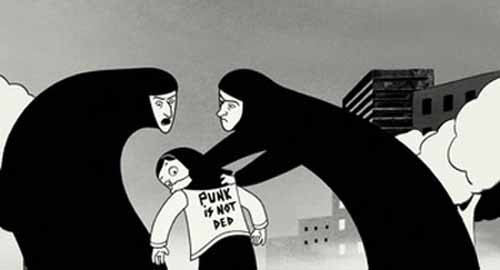|
Reviews of Recent Independent, Foreign, & Documentary Films in Theaters and DVD/Home Video
Written & Directed by Marjane Satrapi & Vincent Paronnaud Produced by Marc-Antoine Robert & Xavier Rigault Editor/Compositor, Stéphane Roche Music by Oliver Bernet Released by Sony Pictures Classics. Language: French with English subtitles. Country of Origin: France. 95 min. Rated PG-13 With the voices of Chiara Mastroianni, Catherine Deneuve, Danielle Darrieux, Simon Abkarian, Gabrielle Lopes & François Jerosme
The film begins at the onset of the Islamic revolution, with nine-year-old Marjane, a Bruce Lee-obsessed pupil at a French secular school. The widespread jubilation of the Shah’s fall is swiftly followed with restrictions by the paranoid new regime. Her school closes down – bilingual schools are now deemed symbols of capitalism and decadence, and by decree, she has to wear a veil. Her handsome Uncle Anoosh, a communist jailed under the Shah and now freed, firmly believes that the religious authorities won’t know how to lead the country and the proletariats will inevitably rule – he will be summarily arrested and executed under the pretense of being a Russian spy. Other well-to-do families flee to the West, demonstrations against fundamentalism are crushed, and then Iraqi scud missiles bomb Tehran. After being expelled from one school for kicking the principal, Marjane tells off the religious instructor at another – signs to her supportive and broad-minded parents that, for her own safety, Marjane needs to go abroad. So at 14, she lands in Austria, alone and knowing no German. Whew! And this is barely half of the story. The film’s conversational and confessional narration flows from one episode to the next, touching on all the books’ major turning points. Not for a moment does it feel like you are sitting through Modern Iranian History 101. As you would expect, the film lands more of a visual punch. The books consist of simple black-and-white drawings, and the film mirrors this look, becoming more layered and detailed as Marjane matures. The characters still have a childlike simplicity, but the atmosphere darkens, with a bit of Edvard Munch thrown in.
Warning: Persepolis uses the ubiquitous “Eye of the Tiger” as an anthem for self-determination. Don’t hold it against the film as Marjane does an
amusing send-up of the song, terribly off-key and in a heavy French accent. And for those who admired the books but don’t like foreign-language films,
you have no excuse. Just think of the subtitles as graphic novel captions.
Kent Turner
|

